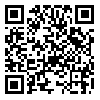BibTeX | RIS | EndNote | Medlars | ProCite | Reference Manager | RefWorks
Send citation to:
URL: http://jcp.khu.ac.ir/article-1-2759-en.html
mind wandering is a pervasive and common phenomenon of human cognition that its role in performance of any field related to mind is undeniable. This study plans to investigate The causal relationship of mindfulness and mind wandering with mediating strategical engagement regulation, anxiety, depression and working memory. To this, 434 female students of Shahid Chamran University of Ahvaz were selected by multistage random sampling method and They got Mindful Attention Awareness Scale, Strategic Engagement Regulation Scale, Stress Anxiety Depression Scale, Stress Anxiety Depression Scale, The Working Memory Questionnaire and The Mind Wandering: Deliberate and Mind Wandering: Spontaneous Scale. Collected data were analyzed by SPSS and AMOS (version 21) and using structural equations modelling method. In order to earn the suitable model fitness indices, the item parceling method was used about mindfulness variable. Finally, on the base of values of some indices (for example, RMSEA = 0/06 and GFI = 0/98), model had a good fit. Also, all paths of the model except two paths: anxiety to working memory and anxiety to mind wandering were significant. In sum, this research results showed that mindfulness plays important role in mind wandering anticipation that transfers this effect through mechanisms as self-regulation, mood and working memory.
Received: 2017/07/12 | Accepted: 2017/11/6 | Published: 2017/12/30
| Rights and permissions | |
 |
This work is licensed under a Creative Commons Attribution-NonCommercial 4.0 International License. |






